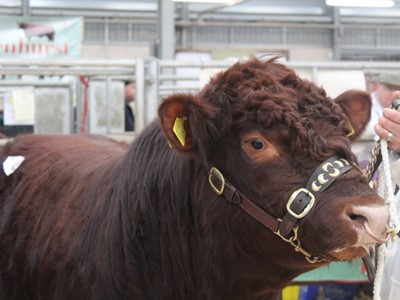While EBVs identify animals that excel in individual traits, they can be combined into breeding indexes using economic weightings to meet a broader breeding objective. Providing breeders with the information to be able to rank and compare animals. This page summarises the breeding indexes Signet currently publishes.
Beef
Update to the Genetic Evaluation of Sussex Cattle
Signet are pleased to announce that we have enhanced the genetic evaluation that we deliver to Sussex cattle breeders through the inclusion of 18,000 additional pedigree records which the Society has provided for cattle born since 2000.
Are big cows better?
How big is your ideal cow? In the show ring, big cows tend to do well. Their size makes them impressive to look at compared to smaller females and for those chasing higher growth rates, a herd of large cows will, on average, produce calves with heavier weaning weights.
However the overall profitability of your farm is not just your income. Especially in the current climate of high costs of fertiliser, labour and feed, reducing input costs is a great way to increase your profit. Smaller cows need less feed and so can greatly reduce your input costs
National Beef Evaluation Carcase Trait EBVs now available through Signet
Since 2018, AHDB has published the National Beef Evaluations, providing estimated breeding values (EBVs) for all breeds and crossbreeds of cattle to allow breeders to select animals for improved carcase and maternal traits. We are now working to make these tools available for Signet recording breeds through the Signet website, which will allow breeders to use all the available information in one place, to select the best breeding animals for their herd. This has been launched for Sussex breeders and other breeds will follow over the next few months, so watch this space.
Scoping study: Delivering a vision for improving the beef and sheep sectors through animal breeding over the next 10 years.
The report presents evidence to inform decisions related to the development of the genetic improvement infrastructure for the UK sheep and beef sector, in order to improve financial sustainability and reduce environmental impact of the sector, including the current financial benefit of genetic improvement.
Marketing your genetics
Signets Sheepbreeder and Beefbreeder performance recording service allows breeders and buyers to identify those animals with the best genetics and make informed decisions. While providing breeders with tools to assist with the marketing of stock for sale at home and market sales.
Performance recorded Lincoln Red genetics in demand at Melton Mowbray multibreed sale
The Lincoln Red Cattle Society premier show and sale at Melton Mowbray on Saturday 25th March saw Signet recorded bulls achieve top prices and taking home a clean sweep in the show classes. The demand for performance recorded cattle wasn’t just seen in their prices but was also reflected in the clearance rates, 100% of performance recorded animals sold.
Reducing carbon emissions through breeding and genetics
This webinar series, in partnership with the British Society Animal Science (BSAS) and Teagasc (Irish Agriculture and Food Development Authority) aims to share the most recent research findings investigating methods to reduce emissions from livestock agriculture and how we can apply this directly to farm.
New EBVs to improve maternal efficiency and productivity
With farmers facing ongoing uncertainties including changes to basic payments and increased pressure to reduce carbon emissions, many suckler farmers are investigating ways to improve the efficiency of their cattle enterprises. Could AHDB's new maternal breed evaluations be the answer? Dr Alex Brown, AHDB's Senior Beef Breeding & Genetics Manager, explains more.
New Weight Recording Initiative for Lincoln Red Breeders
The Lincoln Red Cattle Society have recently announced their intention to provide all their members with free access to Signet’s services. As part of this new initiative with Signet, the Lincoln Red Cattle Society will fund the recording costs of any paid up Society member; effectively removing the financial barrier that may have previously limited smaller herds from engaging in weight recording.









